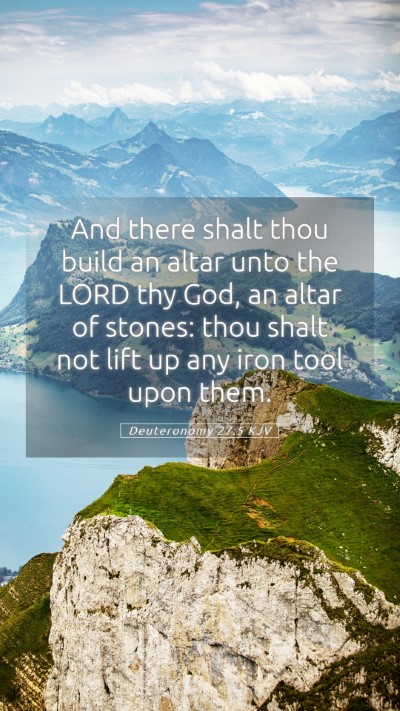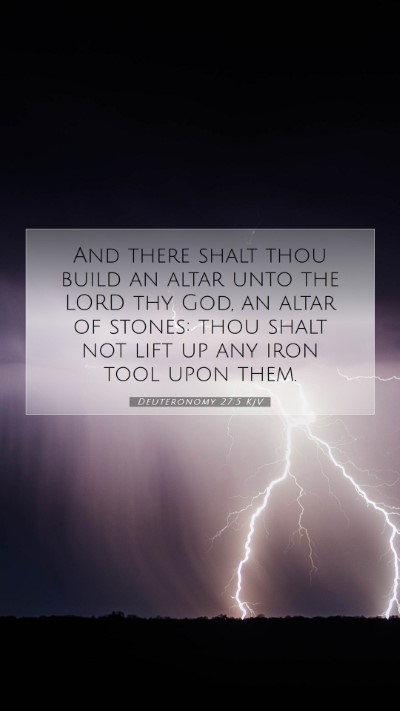Bible Verse Meaning of Deuteronomy 27:5
Deuteronomy 27:5 states: "And there shalt thou build an altar unto the Lord thy God, an altar of stones: thou shalt not lift up any iron tool upon them."
Summary of Deuteronomy 27:5
This verse instructs the Israelites on the proper construction of an altar dedicated to the worship of Yahweh. The command emphasizes utilizing natural stones without human alteration, symbolizing purity and God’s sovereignty in worship.
Insights from Commentaries
- Matthew Henry:
Henry comments on the significance of building an altar with uncut stones, suggesting that it reflects the unaltered and unblemished nature required in worship. The idea here is that God desires authenticity in the relationship between Him and His people.
- Albert Barnes:
Barnes elaborates on the historical context surrounding altars in the ancient Israelite culture and explains that using stones that hadn't been shaped or altered by human hands indicates an act of submission to God. It serves as a reminder that man should not impose his own design on that which is sacred.
- Adam Clarke:
Clarke discusses the significance of the altar as being intended for sacrifices, thus reiterating the importance of purity in worship practices. By using stones in their natural state, it not only reflects obedience to God’s directive but also symbolizes the need for true, unadulterated worship.
Application to Contemporary Life
Understanding this verse today involves recognizing that true worship requires sincerity and a heart dedicated to God. Just as the stones needed to be untouched by tools, our expressions of worship must come from a place of authenticity, free from human alteration or pretense.
Related Biblical Themes and Cross References
- Exodus 20:25: "And if thou wilt make me an altar of stone, thou shalt not build it of hewn stone: for if thou lift up thy tool upon it, thou hast polluted it." - This verse reiterates the importance of using natural stones in worship.
- Joshua 8:31: "As Moses the servant of the Lord commanded the children of Israel, as it is written in the book of the law of Moses, an altar of whole stones, over which no man hath lift up any iron." - Joshua refers back to Moses' commands emphasizing the significance of the uncut stones when building altars.
- Romans 12:1: "I beseech you therefore, brethren, by the mercies of God, that ye present your bodies a living sacrifice, holy, acceptable unto God, which is your reasonable service." - A New Testament connection that emphasizes the idea of presenting oneself before God in pure worship.
Engaging with Biblical Exegesis
For those seeking deeper Bible verse explanations and understanding Scripture, engaging in Bible study groups or utilizing Bible study tools can enrich the study experience. Scholars recommend examining the cultural and historical backdrop of Biblical texts to grasp full meaning.
Conclusion
In conclusion, Deuteronomy 27:5 serves as a powerful reminder of the sanctity of worship and the importance of coming before God in purity and authenticity. As we explore Bible verse interpretations and engage with Biblical exegesis, we discover the timeless truths that underpin our relationship with the Divine.


